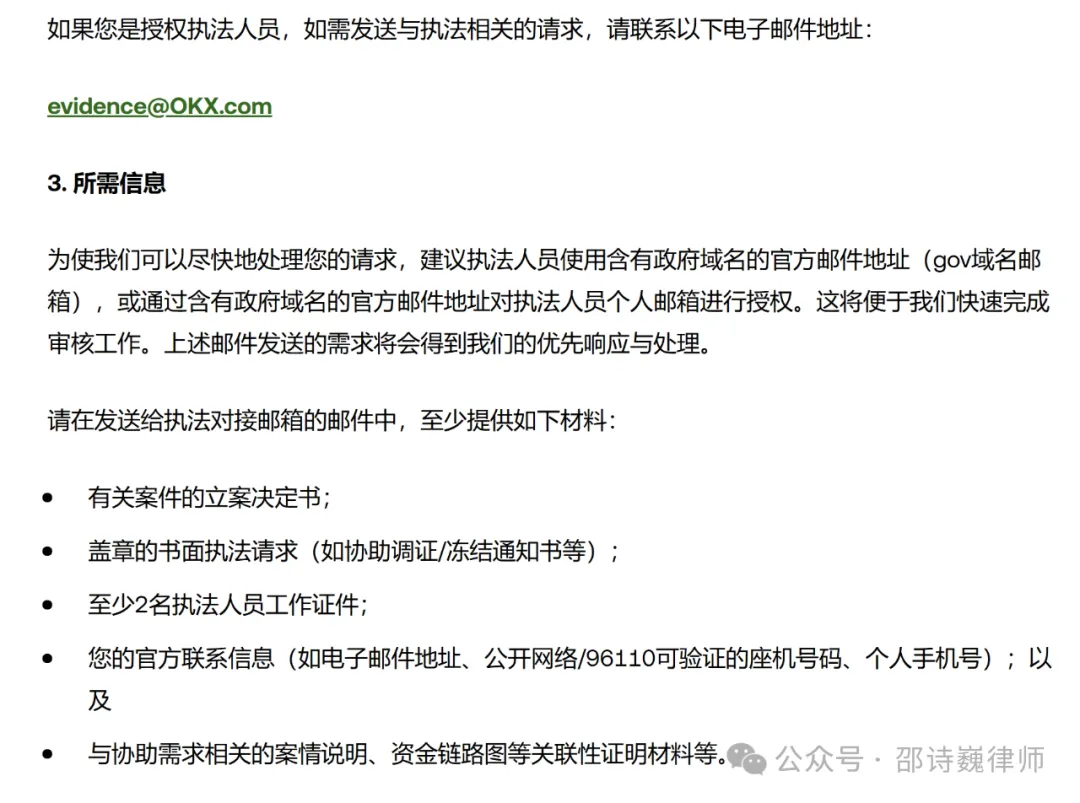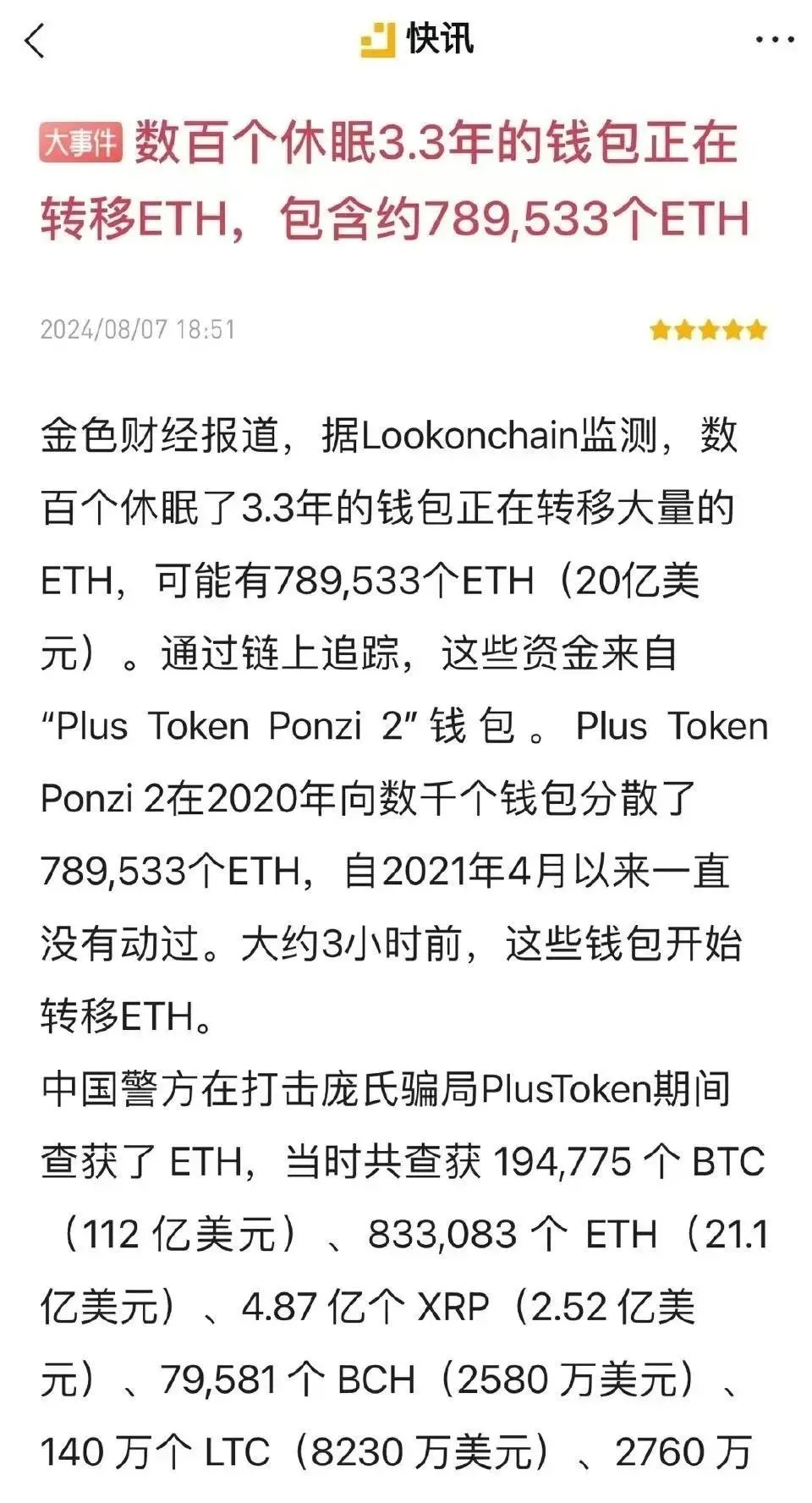
近年来,我们可以看到,有不少法律专家学者、律师、司法系统的办案人员等对于虚拟货币如何合法合规的进行司法处置进行探讨,邵律师也分享过相关观点(➡️《未经法院判决,公安不应处置涉案虚拟货币!》)。
姑且不论公安机关采取什么样的处置流程才合规,但在实操中,办案单位对虚拟货币进行处置有一个充分且必要的前提:需要当事人(刑事案件中的嫌疑人/被告人)主动退赃,自愿上缴。
本文想讨论的问题是,涉案虚拟资产已被公安司法冻结,如果当事人拒绝配合办案人员将自己的虚拟货币从交易所或数字钱包转至办案人员所控制的钱包地址当中,即便是将来有生效的法院判决文书,涉案虚拟货币能否强制执行?
作者 |邵诗巍律师
01
涉案虚拟货币一般处置流程
简单来说,办案单位(实践中目前都是由公安处置,而非法院执行局处置)对于涉案虚拟货币司法处置的流程为:
办案单位冻结涉案虚拟货币(非必须,因为当事人可能会第一时间配合主动上交)➡️当事人配合转移资产至办案单位指定账户➡️当事人配合办案单位授权第三方处置公司将涉案虚拟货币变现为法币。
1、冻结
这里需要区分两种情形,一种是当事人的资产在虚拟货币交易所当中(如币安、欧易等中心化交易所),一种是当事人的资产存放在数字钱包当中。
无论是币安、OKX还是其他主流的虚拟货币交易平台,都推出了专门的执法请求系统,国内公安可以通过这些系统,提交执法请求、冻结涉案账户。


(来源:欧易交易所官网)
通过这种方式,办案单位可以将当事人在交易所中的账户冻结,从而限制账户内资产被转出。
如果当事人的资产存放在数字钱包当中,国内公安可以联系USDT的发行方——泰达公司冻结。例如湖北荆门警方侦破的一起涉案流水达 4000 亿的跨境网络赌博案(全国「虚拟货币第一案」[1]),据报道,“因该平台全部用虚拟货币结算,公安机关就与该虚拟货币发行机构进行对接,将相关涉案虚拟货币账户冻结”。
通过以上方式,办案单位完成了虚拟货币资产处置的第一步:冻结。
2、转移与变现
一般来说,刑事案件当中合法的资金罚没流程为,公安机关经法定流程,将涉案财物采取查封、扣押、冻结等刑事强制措施。案件移送审查起诉后,由检察官对涉案财物提出处理意见。案件再接下来移送法院后,若法院经审查,认为涉案财物属于违法所得或应予以追缴,应作出处理并写在判决书中。判决生效后,若被告人未主动退赃,则审判人员会将案件移送至法院执行局,依法强制执行。
但由于虚拟货币的特殊性(难以保管、币价波动等),并且虚拟货币交易在我国目前被认定为非法金融活动,执法人员将涉案的虚拟货币变现为法币,也有默许虚拟货币交易之嫌,与我国当前打击虚拟货币炒作的政策相违背。所以在实践中,虚拟货币的处置较多的是由公安在侦查阶段即先行处置,即便是在法院判决后的执行阶段,一般还是由公安来进行处理。
接着上文说,在办案单位冻结了当事人的虚拟货币之后,接下来就是让当事人主动退赃退赔,自愿将虚拟货币转移至公安指定地址,并让当事让签署在公安机关见证下的虚拟资产处置协议,让当事人授权第三方处置公司将虚拟货币变现为法币。
第三方处置公司变现的方式目前有:通过交易所线上OTC交易、寻找合适的买家线下交易、与外贸公司合作,以虚构出口贸易等名目,由境外公司汇款再通过外管局结汇流程将资金“合法”入境。
02
问题:若当事人拒绝配合,上述流程还能走的通吗?
先说交易所中的账户资产。根据《公安机关办理刑事案件程序规定》规定,冻结期限为6个月,但在到期之前可以续冻,且续冻没有次数限制。
主流的虚拟货币交易所,一般会配合国内执法机构进行冻结。
但目前有没有虚拟货币交易所依据国内法院的生效刑事判决,配合司法机关将当事人的涉案账户内虚拟货币划扣至办案单位指定地址?据邵律师结合自身办案实践以及公开信息了解的情况来看,似乎没有看到有此类信息。
所以,如果当事人拒绝配合办案单位将交易所中的虚拟货币进行划转及处置,办案单位能采取的手段可能只能是一直将账户内资产冻结。
那么如果资产在钱包中呢?以币圈第一大案plustoken案为例(案件详情可➡️《以案释法丨从400亿币圈传销案看Web3游戏如何规避传销风险?》),据报道,在2024年8月,有数百个休眠了3.3年的钱包正在转移大量约20亿美元的以太坊。因为转移的ETH与判决书中所列金额对不上,以及该案之后,在2022年主办plustoken案的领导因受贿被查, 所以一些人判断,可能是已经出狱的人开始找之前的币了。

如果这个推测属实,就说明在此前有部分钱包地址是办案单位不知道,或者虽然知道,但不了解私钥等信息的。
所以,无论当事人的资产在虚拟货币交易所还是数字钱包当中,目前的虚拟货币司法处置,其实都是建立在当事人主动配合划转虚拟货币的前提之下才能进行的。
03
讨论本问题的意义
最近半年来,远洋捕捞、趋利性执法等问题被广泛讨论。邵律师此前也曾说过,币圈案件由于资金数额较大,被“制造管辖”、面临趋利性执法也并非少见。
在我国,虽然在现有的法律制度当中没有像英美当中“诉辩交易”的概念,但例如认罪认罚从宽处理、与被害人签署谅解协议等,在某种程度上实质上与诉辩交易所达到的效果相类似。
如果是一般的刑事案件,对一般的办案单位来说,当事人不配合就不配合,大不了也就是无法处置的问题,让法院直接判好了。
但对于可能是因经济利益所驱动的案件来说,处置变现才是工作的首要问题。那么这时候,从辩护的角度来说,本文所讨论的议题也不失为是一种谈判策略,虽然,对当事人来说,这显然也是无奈之举。
[1] 全国“虚拟货币第一案”,告破! https://mp.weixin.qq.com/s/SrpguHfXZTNzvC--rueHvg






